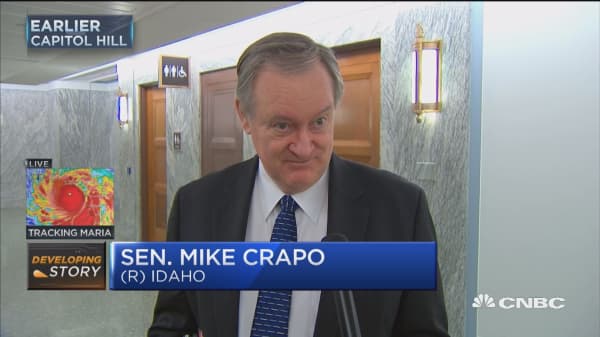Top Republicans on a key Senate panel say they're moving closer to a tax plan that could add as much as $2 trillion to the government's $20 trillion debt over 10 years.
Tennessee Sen. Bob Corker said Tuesday that Republicans have "potentially gotten to a very good place" on agreeing to how much the upcoming tax measure might cost.
As Senate tax writers craft a package of tax rate cuts and curbs on some tax breaks, they hoping to reach a compromise between Senate GOP deficit hawks, who believe tax cuts must be offset by funds raised elsewhere, and "supply side" Republicans who believe any revenue shortfall can be made up through higher revenues generated by faster economic growth.
Though talks have picked up this week, the tentative plan is still in its early stages.
"We are still in the process of negotiating this," Iowa Sen. Charles Grassley told CNBC, who added that the White House and key congressional committees were still working on a "framework" for the tax plan.
"I think we need that because we're going to have to operate within what can be signed by the president," said Grassley, who serves on the Budget and Finance committees.
Corker, who serves on the Budget Committee, believes the plan should not increase the debt.
"I'm all for pro-growth tax reform but over a decade it needs to pay for itself per valid models," he told The Associated Press.
At a Finance Committee hearing on Tuesday, Sen. Ron Johnson, R-Wis., a proponent of tax cuts, said a 10-year, $1.5 trillion tax cut "ought to be a minimum."
Much of the debate over any tax reform plan will rest on models used to generate estimates of the long-term costs to the government and impact on the economy. Central to the issue is a process known as "dynamic scoring," which attempts to estimate the impact of tax cuts on economic growth, and then capture that impact in the overall revenue forecast.
That means that the method used to estimate the revenue and economic impact will be critical to the political success of any plan.
"I don't know a number for an outer limit, but I believe we should have the largest number we can get with adequate dynamic scoring," said Idaho GOP Sen. Mike Crapo.
The scoring will be handled by bipartisan congressional groups that have used dynamic scoring in the past.
In theory, if tax cuts spur growth, a larger economy would make up for the revenues lost by cutting tax rates. But economists are divided on whether that added growth can be counted on to materialize.
Past studies by the Joint Committee on Taxation and the Congressional Budget Office also have cast some doubt on forecasts that assume economic growth will make up for revenues lost from tax cuts.
— CNBC's Ylan Mui and The Associated Press contributed to this story.





